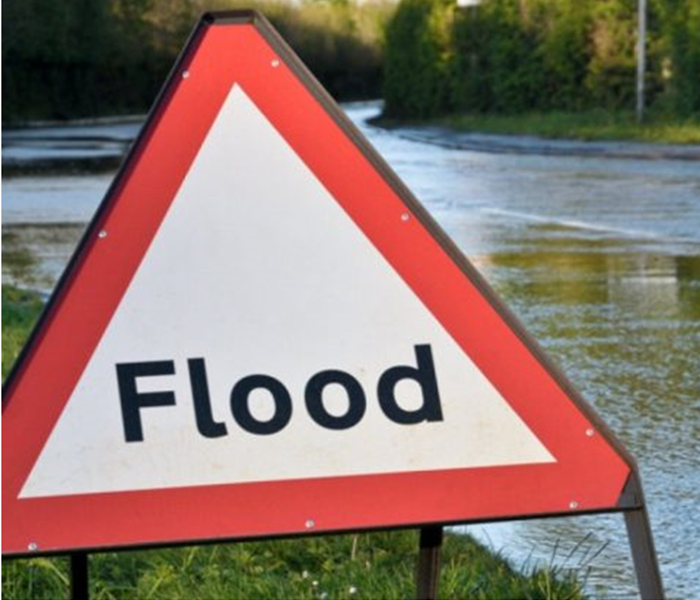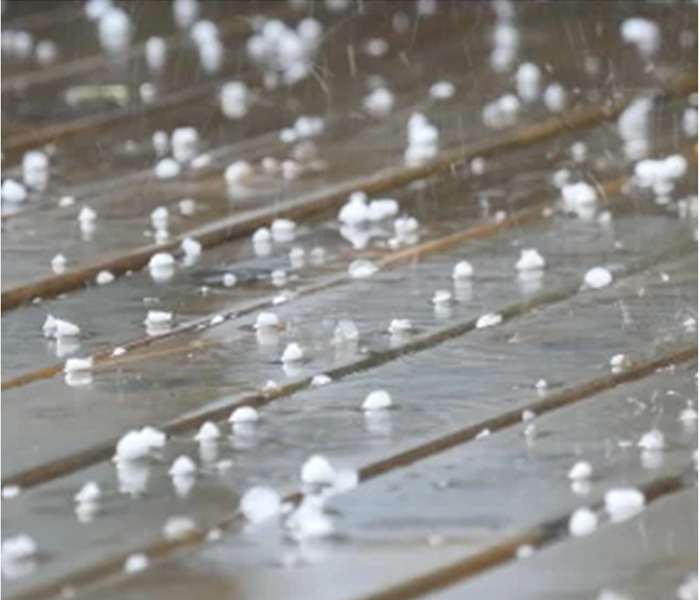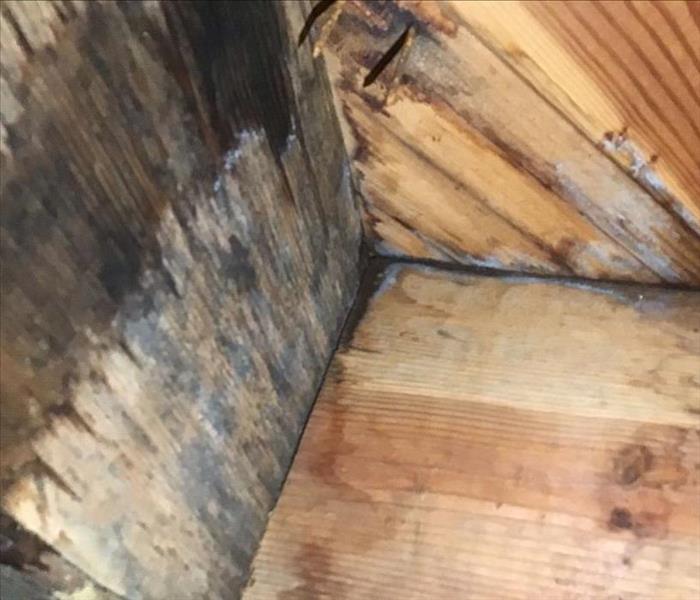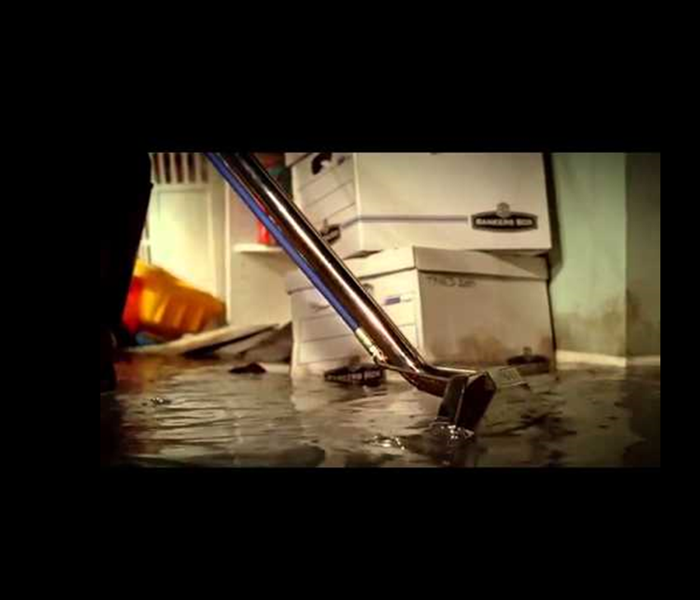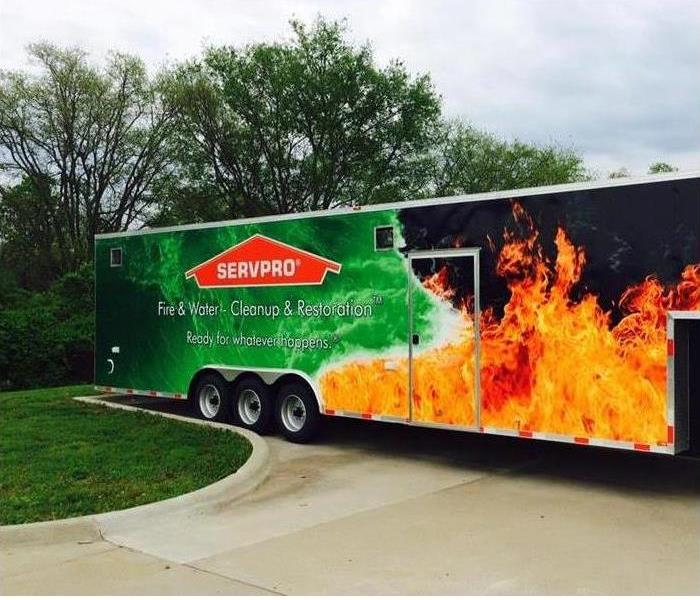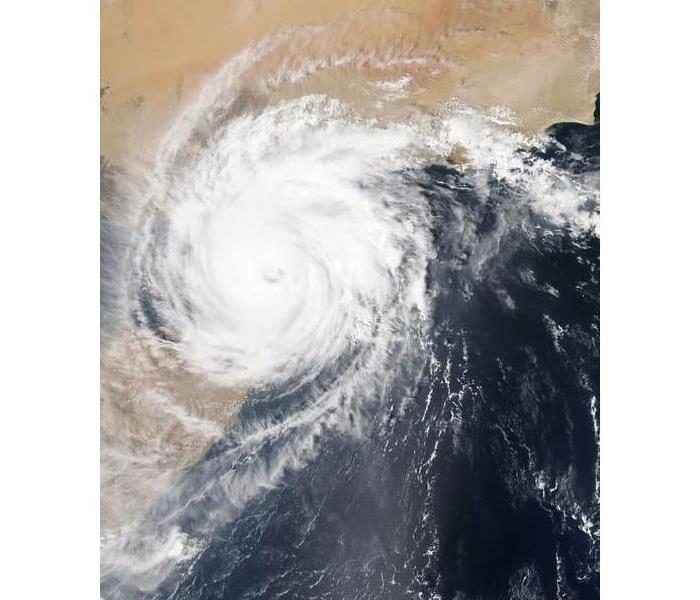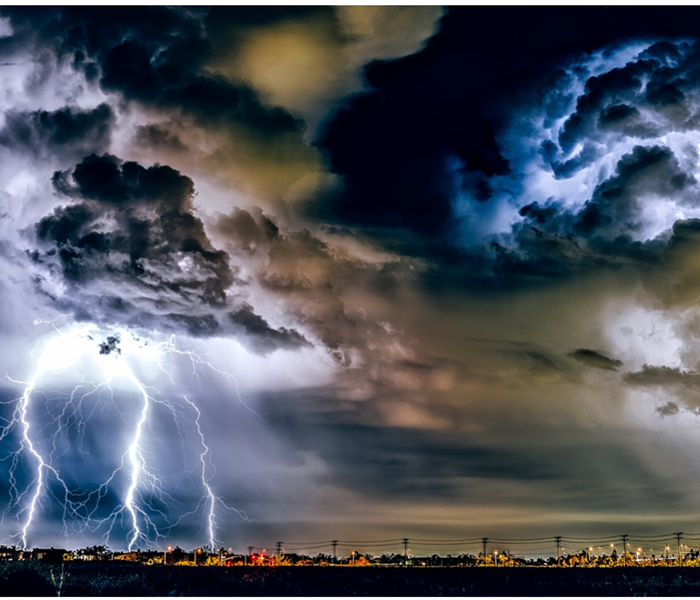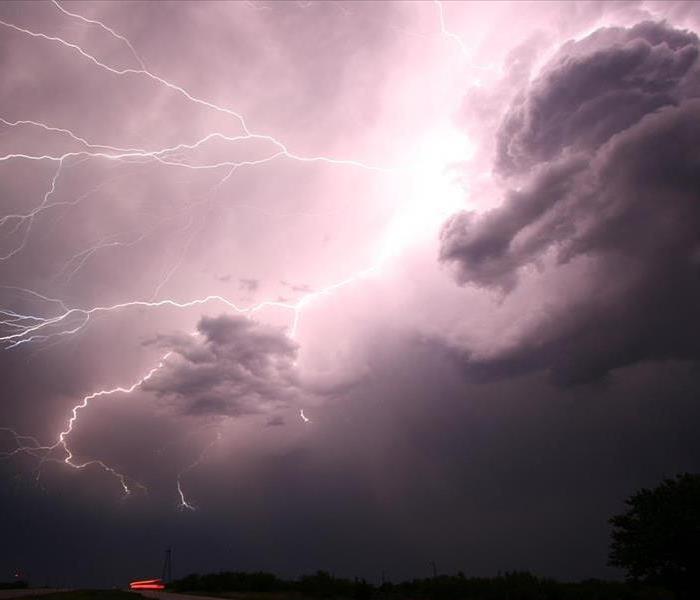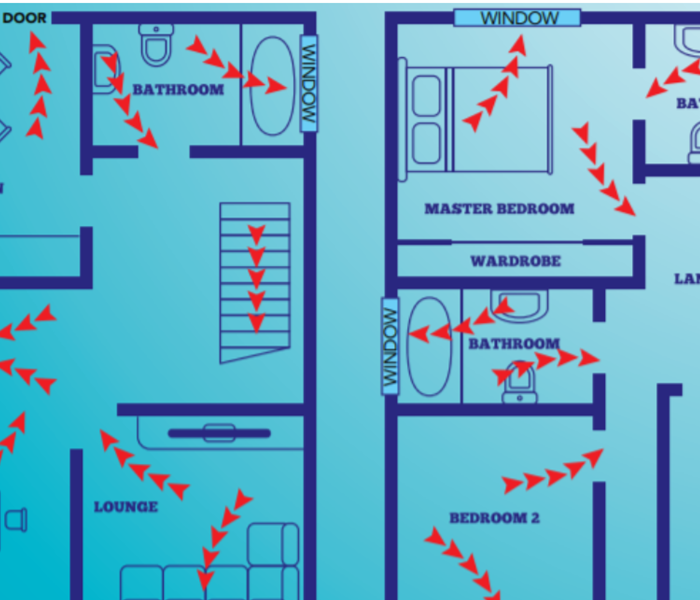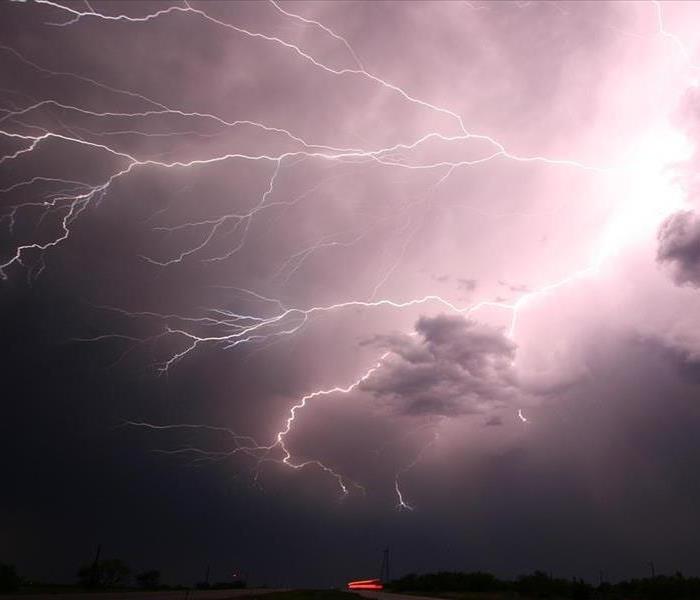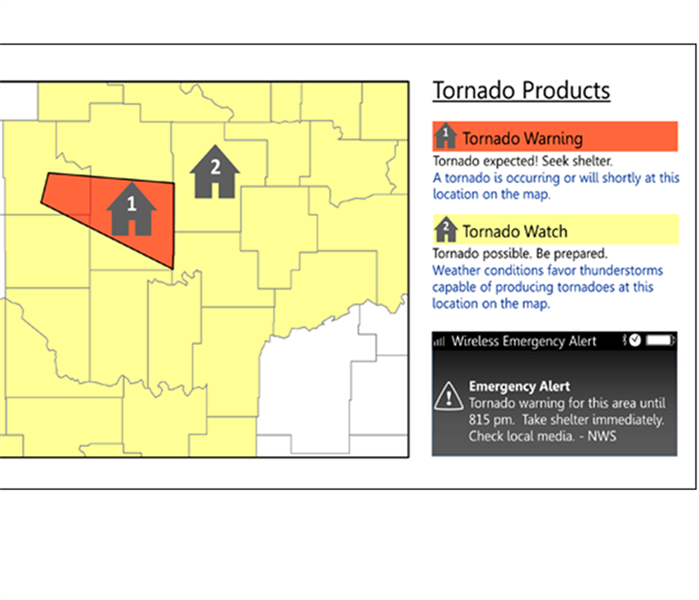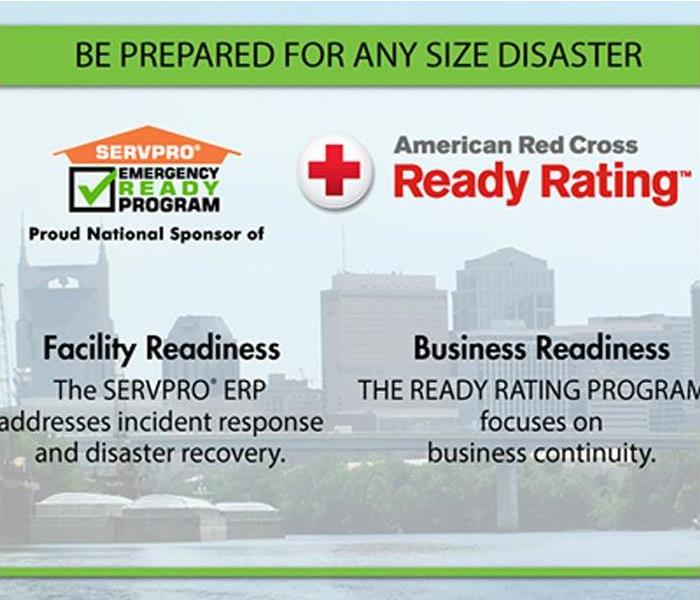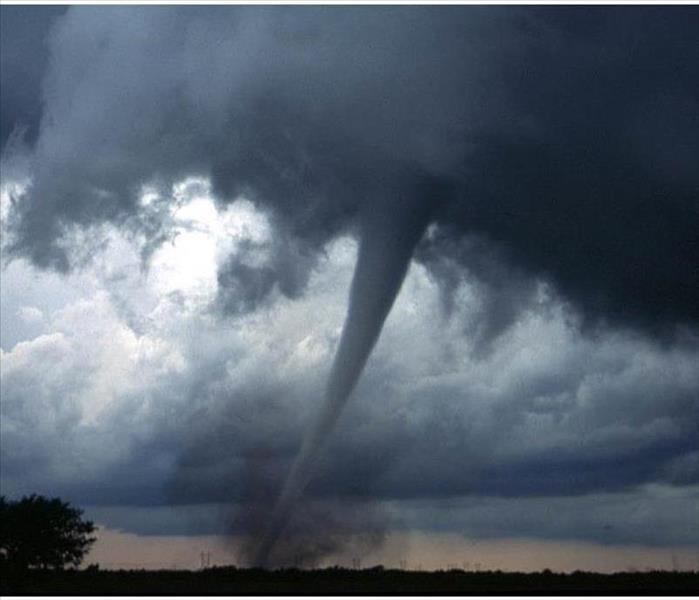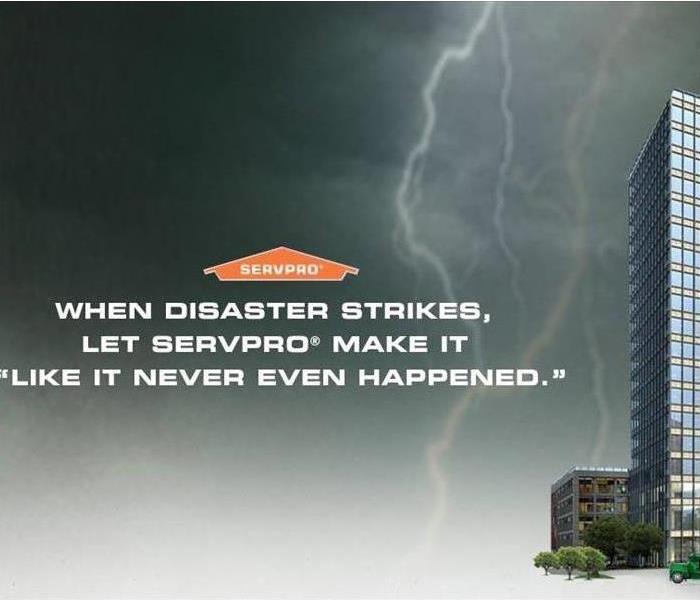Recent Storm Damage Posts
Hurricane Season is Upon Us
11/22/2024 (Permalink)
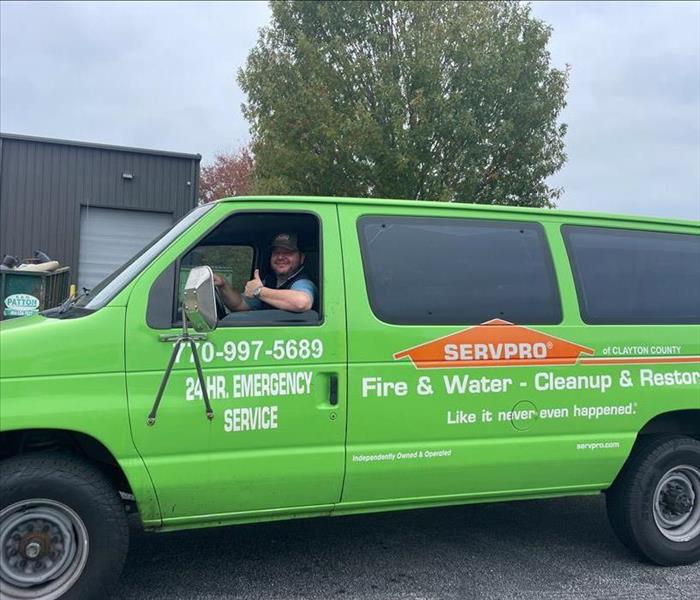 Rain or shine, we are ready when disaster strikes.
Rain or shine, we are ready when disaster strikes.
I’m sure everyone has already noticed, but it's Hurricane season, and that can mean hazardous weather conditions in your area. Even if you are not living on the coast, you can still be affected by Hurricane season, as we have all seen recently with the devastating effects of several hurricanes this fall. Hurricanes can produce strong winds, storm surge flooding, and heavy rainfall that can lead to inland flooding and tornadoes. Another serious risk is falling trees from winds and rain. All of these things can cause serious damage to your property. At SERVPRO, we are ready for any size disaster, and we are available 24 hours a day, 7 days a week. Call us at 678-432-3003 if you are impacted by severe weather, and we will be ready to assist you!
Have You Considered a Family Emergency Kit?
11/2/2022 (Permalink)
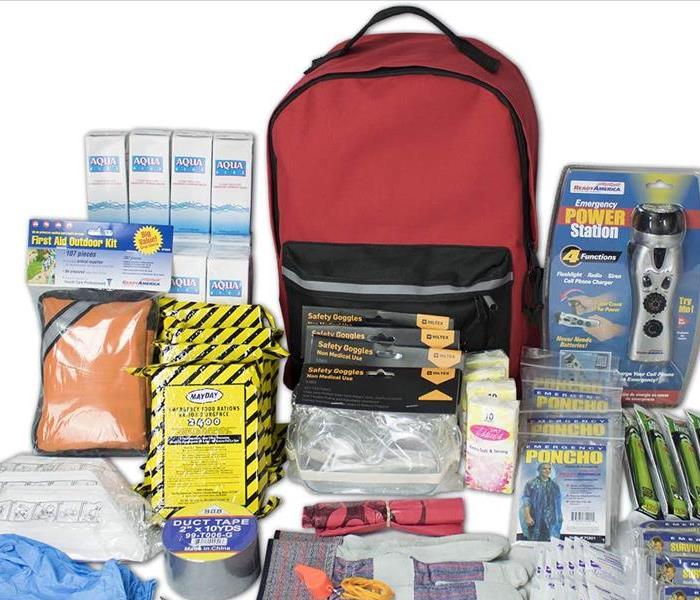 An example of items in your storm kit
An example of items in your storm kit
The Southeastern US is quite a hot spot for severe storms, especially those areas near the coastal areas. Having an emergency kit to survive a bad storm containing power outages for days as emergency personnel make their way to fallen trees on powerlines is always a good measure to follow. And as with any item you rarely use, it is important that you store it in a location that is easily accessible in the time of an emergency. If you are keeping up with the news regarding Hurricane Ian, you have probably seen news clippings of families expressing how much they wish they had this or that and how it would have helped them in a tremendous way in dealing with the aftermath of the storm. Please do not wait for an event to happen—instead, get out ahead of it.
Items to consider for your family’s emergency kit:
- Storage: Purchase a heavy-duty plastic storage tub with latching lids. Store smaller items inside the tub in air-tight plastic storage bags. Make sure this storage container is easy to access on a moment’s notice.
- Water: Store unopened water bottles in a cool, dark environment next to your emergency kit. You want to figure enough water for 1 gallon per day for each family member. It is also a good idea to plug a bathtub and fill it with water to use for basic hygiene and sanitation procedures.
- Food: Store a three-to-four-day supply of nonperishable food in your emergency kit. Keep an eye on expiration dates. Food items with longer shelf lives include but not limited to canned veggies, soups, energy bars, and unsalted nuts. Remember this is an emergency, storm-survival kit—not trying to win a cooking show here.
- First Aid: Essential to any survival kit is having first aid handy and ready to use, if needed. You will want the necessities to a First Aid Kit, so of course Motrin/Tylenol, and any store supplies to treat injuries like cuts, wounds, pain and burns.
- Toiletries: All the type of items you tend to forget about in a normal day having plenty of supply. You will want to include the basics in your kit: toilet paper, tissue, soap, toothpaste, diapers and hand sanitizer.
- Radio: We live in a day where an AM/FM radio is nearly foreign to children today, so this is a perfect time to run to Walmart (with your child for educational purposes) and purchase a battery-powered or hand crank radio so you can tune in to important storm warnings and other emergency information that would normally be available at your fingertips. To avoid corrosion, store your batteries for the radio, uninstalled, in a plastic baggy labeled “Radio.”
- Flashlight / Lantern: Being in the fire restoration business, it is encouraged to steer clear of using burning candles for light, especially with pets and children present in the home. Instead, make sure and pick up a flashlight or lantern along with an extra set of batteries!
- Heat: An indoor propane heater or a camp-like stove can act as much needed comfort when the power is out for an extended period. But whatever you do, please make sure the heater (or stove) is safe for indoor use.
- Cash-on-Hand: Even when the storm is over, ATMs and credit/debit card machines could still be down. Make sure to keep a backup supply of cash for emergency supplies needed when stores are unable to accept plastic.
Storm Damages: Wind, Flood and Lightning
10/5/2022 (Permalink)
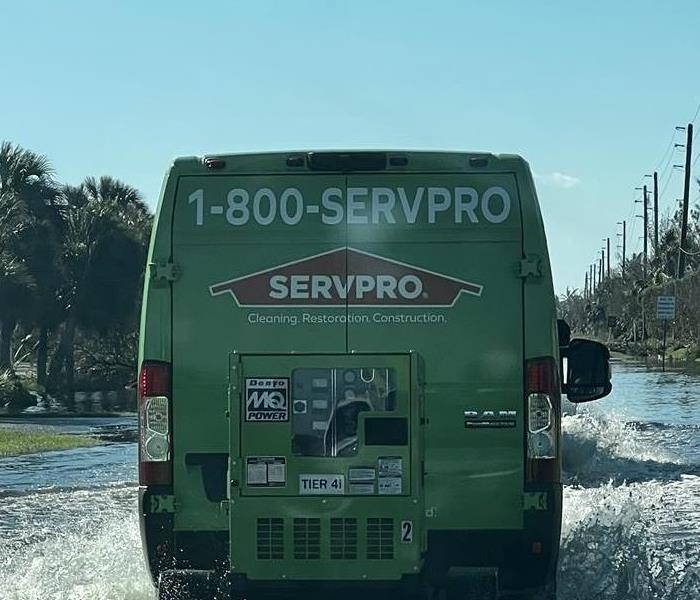 SERVPRO of Henry, Spalding & Butts Counties working to help families affected by Hurricane Ian
SERVPRO of Henry, Spalding & Butts Counties working to help families affected by Hurricane Ian
Back in May of this year, the National Oceanic and Atmospheric Administration (NOAA) predicted elevated chances of a hurricane, and just when storm restoration professionals thought that perhaps they may have missed it as we near the end of hurricane season, Ian, a large, deadly, and destructive Category 4 Atlantic hurricane made its way across western Cuba and into the southeastern United States—specifically Florida and South Carolina.
Until we are safely through the month of November, there is still risk of a tropical storm, and it’s important to know the differences among the common types of storm damages. Wind damage. Weather professionals reported wind speeds upwards of 155mph from Hurricane Ian as it made its way into Florida. Wind damage from a storm can range from causing missing shingles which, in turn, can result in a major water damage, or a small roof leak that can later, if undetected, produce damp, moldy conditions inside your home or place of business.
Whether it is from a hurricane or a common storm causing heavy rains for longer than normal periods of time, flooding damage is a monster in and of itself. Even if you were not in the eye of Hurricane Ian, it is not uncommon for a rainstorm to cause smaller bodies of water, such as rivers, to flood your area. Our team at SERVPRO of Henry, Spalding and Butts Counties can assist in the cleanup process after flood damage has occurred.
We must not forget about lightning damage. Lightning damage can come with a bevy of other related hazards caused by the lightning strike. Perhaps the largest threat from lightning results in a fire damage to your home or business. With a power of 300 kilovolts, lightning can heat air up to 50,000 degrees Fahrenheit! That is some serious power! According to the National Fire Protection Association, the average number of lightning fires reported to fire departments is 22,600 annually. Each year, an estimated $451 million is lost in property damage resulting from lightning-related fires.
What is a Flood Risk Zone?
7/19/2022 (Permalink)
Do you know if your home is in a flood risk zone? According to FEMA, a flood zone is defined as the area that will be inundated by the flood event having a 1% chance of being equaled or exceeded in any given year. There are three different risk zones, High, Moderate, and Minimal.
If you are not sure if your house is located in a flood risk zone, FEMA has resources available to check by address, place, or longitude/latitude coordinates here.
Water can be extremely destructive to a home or business. It is important to prepare and understand insurance costs associated with these types of properties, especially flood insurance since conventional home insurance typically does not cover damages caused by a flood.
If you recently experienced flood damage, SERVPRO of Henry, Spalding, Butts and Clayton Counties can help you with the mitigation and reconstruction. No job is too big or too small for our crews. Call us at 678-432-3003.
Thunderstorm Safety
7/7/2022 (Permalink)
Summer storms are inevitable in our area, and that means that you should have a plan in case things turn dangerous.
According to the National Weather Service, a thunderstorm is considered severe when either hail is 1 inch in diameter or larger and/or wind of 58 miles per hour or greater is expected. Similar to tornado warnings, severe thunderstorm warnings alert the public of a polygon-shaped warning normally for 30 to 60 minutes at a time. These warnings could indicate imminent danger to life and property. There is also a severe thunderstorm watch, which is issued when severe thunderstorms are possible in the area, but it does not mean they will occur.
If you recently experienced water damage due to a storm, call a company that has the knowledge and expertise to help with the damage. At SERVPRO of Henry, Spalding, Butts, and Clayton Counties we have decades of experience dealing with these types of situations. Give us a call today at 678-432-3003 and we will help you make it “Like it never even happened.”
Summer weather issues in Georgia
7/6/2022 (Permalink)
The climate of Georgia in the summer can be very hot, very long, and very humid. These past few weeks, we have dealt with 95°F days. This combination of factors is the perfect environment and can lead to mold problems for many homeowners and business owners in our area.
Surface mold can appear quickly, and it is mainly due to high levels of humidity in poorly ventilated areas. You should never leave mold untreated because it will only create bigger problems and will not go away on its own. Our Mold Technicians usually see a lot of mold in organic materials, which is the perfect “food” to propagate mold.
SERVPRO of Henry, Spalding, Butts, and Clayton Counties has its own Mold Division. If you are dealing with mold issues in your home or business, please call the experts to assess the issue. We are available 24 hours a day, 7 days a week- Call 678-432-3003
Several storms are heading towards Henry and Clayton County in the next couple of days
6/30/2022 (Permalink)
It looks like we are getting ready to experience severe weather for the next couple of days in the area. According to the NOAA National Severe Storms Laboratory there are 16 million thunderstorms worldwide each year, 100,000 of those here in the U.S. Storms are more likely during the spring and summer months, especially in the evenings.
These storms can cause flash flooding, lightning, hail, can knock down power lines and trees, etc. These events can greatly affect homeowners and their properties. It is always a good idea to have a plan in place when a storm hits so that your family knows what to do and where to go in case of an emergency.
Things you can do before a storm hits are established a communication plan with your family, have a disaster supply kit handy and tell your family where it is located, teach young kids the difference between a thunderstorm watch and a thunderstorm warning. Look around your home and secure outdoor furniture, etc., and bring your pets inside.
If you notice storm damage, call SERVPRO of Henry, Spalding, Butts and Clayton Counties and start the restoration process right away. Let us help you make it “Like it never even happened.” Contact us 24/7 at 678-432-3003.
SERVPRO of Henry and Spalding Counties and SERVPRO of Clayton County is a Certified Large Loss Response Team
11/8/2021 (Permalink)
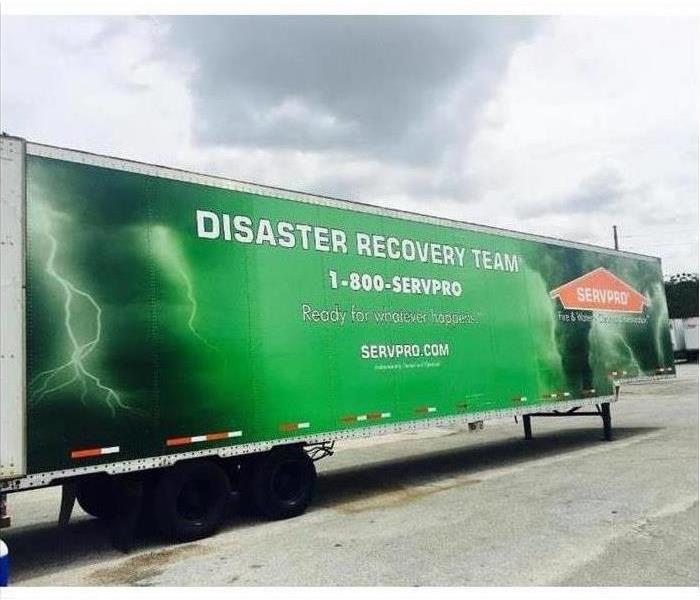 SERVPRO disaster recovery truck
SERVPRO disaster recovery truck
SERVPRO’s of Henry & Spalding Counties is certified as a SERVPRO, Inc. Large Loss Provider! This means we can handle losses of any size, large or small!
The SERVPRO Disaster Recovery Team can provide help whether you're dealing with a tornado, hurricane, blizzard, or flood. The SERVPRO System has a network of strategically positioned storm teams on standby should a disaster strike near you. Available 24 hours a day and 365 days a year, SERVPRO Franchise Professionals are prepared for the unpredictable.
At SERVPRO, the difference is our ability to dispatch trained production professionals and cut costs through strategic placement. Get help from the professionals; call SERVPRO of Henry & Spalding Counties at 678-432-3003!
With the ability to mobilize local command centers, along with the resources of almost 1,800 Franchises nationwide, no disaster is too big. We are ready for your phone call!
Mold after a storm
7/26/2021 (Permalink)
Mold can become a huge problem for homeowners after it goes unnoticed for some time, sometimes in as little as 48 to 72 hours.
If you start noticing a musty odor that was not there before, it may be an indication that mold could be hiding behind drywall and insulation or floors.
SERVPRO of Henry and Spalding Counties and SERVPRO of Clayton County’s technicians have the necessary equipment and training to handle any mold problem, no matter how big or small.
What to Do:
- Stay out of affected areas.
- Turn off the HVAC system and fans.
- Contact a SERVPRO Franchise Professional for mold remediation services.
What NOT to Do:
- Don’t touch or disturb the mold.
- Don’t blow air across any surfaces with visible or suspected mold growth.
- Don’t attempt to dry the area yourself.
- Don’t spray bleach or other disinfectants on the mold.
Have a Mold Problem? Call Today Us At 678-432-3003.
What to do after a summer storm in Henry County
7/23/2021 (Permalink)
Right after a powerful storm, we get a lot of calls from homeowners saying that there is water coming from the yard into their basements, through windows, doors, ceiling, etc. In cases like this, immediate action is needed, and you need to call an experienced company to handle these types of water damage. We recommend that you take pictures of the damage, check your insurance policy to see if flooding from natural disasters is a covered loss.
SERVPRO of Henry and Spalding Counties and SERVPRO of Clayton County is here to help homeowners restore their properties to their preloss condition. We provide 24-hour emergency services, 7 days a week. We will provide water damage restoration technicians and applied structural drying technicians to determine the extent of the water damage and help with any of your storm damage needs.
- Flooding caused by heavy rains
- River and creek surges
- Tornado and wind damage
Regardless of the Storm Damage, We Can Help- Call us at 678-432-3003
Water Damage Emergency Tips
7/9/2021 (Permalink)
What you can do until help arrives
What you can do until help arrives
After any water damage situation, your primary and only focus should be safety:
- Do you think it is safe to remain in the house?
- Pay attention to electrical hazards, and if it is possible, turn off the power
- Don’t walk around inspecting the damage, “slip and fall hazards are some of the most prevalent concerns.
- Only do activities that are safe for you to perform.
- Don’t lift wet materials, they can be VERY heavy.
- Be careful and use common sense!
Do You Have A Water Damage Emergency? We can help you minimize the water damage and save some of your most prized possessions. Regardless of the source, SERVPRO of Henry & Spalding Counties and SERVPRO of Clayton County can handle any size disaster
Call SERVPRO of Henry and Spalding Counties and SERVPRO of Clayton County today at 678-432-3003 if you have storm damage, flooded basements, sewage backups, flooding from firefighting efforts, etc
Planning for a Storm loss
7/8/2021 (Permalink)
Hurricane peak season runs for the months of July, August and September. Now is a great time to start thinking about your preparedness efforts, in the event of a hurricane or strong storm.
After experiencing last year’s more active than normal hurricane season, Property Managers in Henry, Spalding Clayton Counties should prepare in case we are threatened by inclement weather.
Here are some tips
- Plan ahead
- Come up with a “Playbook.” The playbook or manual should include employees’ phone numbers, emergency contacts, who is responsible for what, etc.
- Talk with your employees and determine who will be considered essential personnel
- Have a meeting with the building owners and then meet with tenants to inform them of the action plan in case of inclement weather
- Prepare an evacuation route and post it throughout the building
- Think about implementing an automated email, text, or voicemail message to keep your tenants/employees informed
- Have all the insurance information up to date and keep it in a safe place
- If evacuation is mandatory, nobody should remain in the building
If you don’t know where to start, give us a call today so we can tell you about our Emergency Ready Plan.
Call Us Today – We’re Ready To Help 678-432-3003
How to Deal with Damage to Your Home after a Storm
7/6/2021 (Permalink)
Mother Nature to cause extensive and expensive damage to your home or business. It’s been such a rainy month in Georgia that it doesn’t take much to bring trees and powerlines down.
Here are a few tips to prevent storm damage to your property
- CLEAN THE GUTTERS (preferably twice a year, but definitely in the fall). It doesn’t take a lot of dead leaves and branches to clog downspouts.
- Check your roof for loose or missing shingles. If you see that your roof is damaged, repair it immediately. It is much cheaper to replace missing shingles than wait and be forced to repair your ceilings, walls, and deal with mold due to poor maintenance.
- Walk around your yard and inspect trees- If you are not sure if a tree needs to come down, call a tree expert
- If you have any questions about your coverage, call your insurance agency.
Let SERVPRO of Henry and Spalding Counties and SERVPRO of Clayton County keep your home safe from storm and water damage. Our crews are highly trained and we use specialized equipment to restore your property to its pre-storm condition.
Have Storm or Flood Damage? Call Us Today 678-432-3003.
Flooded basement due to heavy rain
11/9/2020 (Permalink)
If you are dealing with a flooded basement, make sure you call a restoration company with the experience needed to tackle this type of water damage.
At SERVPRO of Henry and Spalding Counties and SERVPRO of Clayton County, our crew has the necessary equipment to pump out the water from your basement and start the drying process. Do not leave standing water for a long period because basements are prime spots for mold to spread.
Useful tips to prevent further damage: Clean the gutters regularly, invest in a good sump pump, buy flood sensors (choose one where you get alerts sent straight to your phone), and protect basement windows with a window well cover.
Hire a qualified flood restoration company like SERVPRO of Henry and Spalding Counties and SERVPRO of Clayton County to help with your flooded basement- 678-432-3003.
Prepare for Thunderstorms
7/30/2020 (Permalink)
Thunderstorms occur year-round but they are more common during the spring and summer months, and on average they typically last 30 minutes.
According to the National Weather Service Storm Data, there are an average of 43 lightning fatalities per year
Do you know the difference between a storm watch and a storm warning?
- A watch means conditions are favorable for the development of severe thunderstorms in and around the watch area. It only means that it is possible for a thunderstorm to occur.
- A warning means severe thunderstorms are occurring or imminent in the warning area.
BE PREPARED
- Check the forecast often to see if you are in the storm path
- Sign up for phone notifications
- Build an emergency kit
- Make a family communication plan
- Postpone outdoor activities
- Shutter windows and secure outside doors
- Unplug electronic equipment before the storm hits
If your home or business has sustained damages, call SERVPRO of Henry and Spalding Counties and SERVPRO of Clayton County at 678-432-3003.
Storm Cleanup- We are Ready for Any Size Disaster
7/27/2020 (Permalink)
SERVPRO of Henry & Spalding Counties and SERVPRO of Clayton County’s large loss specialists are ready to help you after these summer storms hit. Dealing with the cleanup after a storm can be overwhelming, that is why you should contact a company with years of experience in the restoration business.
Do not let a storm devastate your life, instead be prepared for anything it has to throw at you! Call the professionals at SERVPRO of Henry & Spalding Counties and SERVPRO of Clayton County today to schedule an appointment- 678-432-3003
We Have the Resources to Handle Storms and Disasters
- Residential properties
- The Hospitality Industry
- Property Managers
- Universities
- Municipalities
If you find yourself in a situation where your house (or business) has been affected by storm damage, call us today and we will make it "Like it never even happened."
SERVPRO of Henry & Spalding Counties and SERVPRO of Clayton County- Here To Help 24/7
7/10/2020 (Permalink)
 Call us today 678-432-3003
Call us today 678-432-3003
Storm damage can happen without warning around this time of year. It could be due to heavy rain, wind, hail, down trees, etc.
This year we have received many of calls from homeowners requesting our help to remediate the damage in their basements and homes. We always tell them that safety should be their priority. It is always better to wait for a professional to say it is safe to go back inside.
Trust a restoration company to assess the damage and get started with the cleanup process. SERVPRO of Henry & Spalding Counties and SERVPRO of Clayton County is always storm ready. We have more than 20 years of experience dealing with natural disasters across the southeast.
Our technicians have the equipment and training necessary to tackle any size disaster. Call us today 678-432-3003
SERVPRO of Henry & Spalding Counties and SERVPRO of Clayton County…Faster to Any Size Disaster!
7/9/2020 (Permalink)
After a storm, SERVPRO of Henry & Spalding Counties and SERVPRO of Clayton County are prepared to help you with any size disaster. We specialize in storm and flood damage restoration.
Our professionals have the necessary training and equipment to make sure that your home or business is restored to its preloss condition. The key to minimize the damage after a storm is to act quickly, since mold can develop in as little as 24 to 48 hours.
Dealing with the aftermath of a storm is devastating…call the experts to guide you through the restoration process. We are locally owned and operated, so we can start the mitigation process right away. Contact us here or call 678-432-3003 if you need help with
- Flooding caused by heavy rains
- Tornadoes and wind damage
- Hurricanes
- Wildfires
Water Damage After a Storm
7/7/2020 (Permalink)
 Call us today at 678-432-3003
Call us today at 678-432-3003
Be proactive and inspect your home for early signs of water damage every couple of months. Check for cracks in the foundation, inspect your basement or crawlspace for any signs of moisture, check your roof for missing shingles, check around windows and doors for any indication of water damage or mold. Inspect behind appliances, like the fridge, freezers, or washing machines. Check the plumbing around tubs, toilets and sinks for leaks.
Dealing with water damage can be a headache for homeowners. Water damage could happen suddenly during or after a storm, over time (a slow drip behind an appliance, seepage from cracks in the foundation, missing shingles damaging the attic), or for no reason at all (pipe burst, broken water heater, sewage backup, etc.). The key to minimize the damage is to act right away and call the experts.
If you do see signs of water damage, call the experts at SERVPRO of Henry & Spalding Counties and SERVPRO of Clayton County to help you remediate the damage. Our highly trained technicians have the right equipment and expertise to extract -the water and restore your home to its preloss condition.
Call us today at 678-432-3003, we are available to help 24/7.
Basement Flooding after a Storm
11/11/2019 (Permalink)
 Call us today at 678-432-3003
Call us today at 678-432-3003
What can you do if your basement floods every time a storm rolls through Henry County?
This is one of the biggest problems with basements, since they are on the lowest level of the home, usually entirely below ground level, and they have a higher chance of experiencing some type of water damage.
It is important to determine where the water is getting into the basement and extract it in a timely manner. Our highly trained water damage specialists at SERVPRO of Henry and Spalding Counties have more than 20 years of experience dealing with water damage restoration in basements and crawlspaces. We have the proper equipment, experience, and expertise to remove the water and dry your basement properly. We will inspect the structure, mitigate the damage, clean and disinfect the affected area, and make it “Like it never even happened.”
Call us today at 678-432-3003, we are available 24 hours a day, 7 days a week.
Home Evacuation Plan
8/2/2019 (Permalink)
Emergencies can happen anywhere and at any time. A fire can start in the middle of the night, and if that happens does your family know what to do? How to safely get out and where to meet? Benjamin Franklin said that by failing to prepare, you are preparing to fail. Call a family meeting and get all the members to participate in creating a family evacuation plan. Having a plan can save your family in case of an emergency.
- Draw a map of your home and come up with an evacuation plan
- Walk around each room and find two ways to get out
- Open every window in the home and make sure each one can be easily opened
- Install smoke alarms in every bedroom and outside each sleeping area
- Go outside and choose a meeting place in the front of the property
- Make sure every single member of the family is aware of the plan
- Save your Henry County Fire Department’s phone number on every cell phone
- Conduct a fire drill (yesssss, we know it sounds silly, but practice makes perfect)
- Print several copies of your evacuation plan. Tape one to the fridge
You can download a free escape plan here.
For any questions about fire damage, call the experts at SERVPRO of Henry and Spalding Counties- 678-432-3003.
Having problems with your flooded basement? Call SERVPRO of Henry and Spalding Counties now
7/31/2019 (Permalink)
We have been dealing with quite a few t-storms and heavy rains this month in Henry County. With so much rain comes super-saturated soil. When the ground gets saturated, its ability to absorb water decreases and all that water might end up finding its way into your basement.
Sadly, it is not that uncommon for us to get quite a few phone calls regarding flooded basements after heavy rainfall. Since your basement is in the lowest level of your home (partially or completely below ground) it is relatively easy for water to sip in.
Other reasons for your basement to flood are sewer backups, foundation problems, hot water heater failure, or a natural disaster.
If you basement recently flooded, call the experts at SERVPRO of Henry and Spalding Counties. We have the experience, the knowledge and the equipment necessary to restore your basement to its preloss condition. Contact us online or call 678-432-3003.
Stay safe during bad weather
7/12/2019 (Permalink)
Storms are really common during the summer in Henry County and July is a prime month for pulse thunderstorms. The average storm only lasts about thirty minutes, but it can cause severe damages due to strong winds, hail and lighting strikes.
Listen to the local news or the NOAA (National Oceanic and Atmospheric Administration) weather radio to see when can you expect severe weather.
When should you seek shelter? If there is a watch or a warming issued for severe thunderstorms that means that you should head or stay indoors, since sever weather is imminent in your area. Avoid using any of your electronics, appliances, etc. until the storm has passed. Keep a safe distance away from windows and glass doors. Don’t forget about your furry friends, and bring them inside too.
Visit www.redcross.org to learn more about thunderstorm safety.
If your home or business is damaged from a storm call SERVPRO of Henry and Spalding Counties at 678-432-3003!
Things to do around the house before a storm hits
7/11/2019 (Permalink)
We’ve had a couple of weeks with severe storms in Henry County. Although it is hard to prepare for a storm, there are a few things you can do to minimize the damage to your home when severe weather strikes.
- Clean the gutters at least twice a year. If you can’t do it yourself, hire a professional to help you
- Check the front and back yard for dead or rotting trees. If you spot big dangling limbs, be sure to trim them. Even medium size tree limbs can damage your roof and cause interior damage to your home
- If your roof is more than five or ten years old, be sure to inspect it for loose shingles and sheathing
- Secure your outdoor furniture, umbrellas, grills, tables to prevent those objects from damaging your deck or windows
In the event that a storm damages your home or business, the team at SERVPRO of Henry and Spalding Counties is ready to help, Call us today at 678-432-3003.
Prepare for an emergency
7/10/2019 (Permalink)
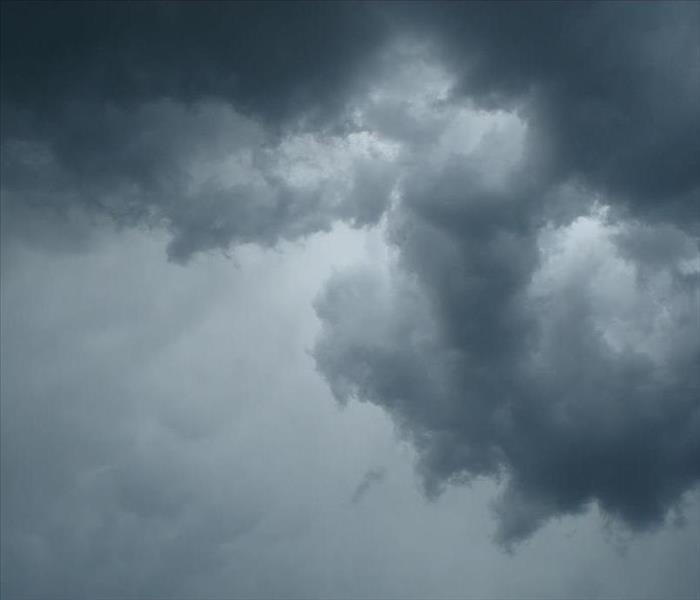 Call SERVPRO of Henry and Spalding Counties today and we will help you with your ERP
Call SERVPRO of Henry and Spalding Counties today and we will help you with your ERP
It’s that time of year again…Hurricane Season, but are you prepared in case of a natural disaster emergency? Does your family have a plan in place? Do you have a designated meeting place in case phone lines are down? What is your shelter plan? These are important questions that can be thought of and put in place in advance.
It is so important for homeowners to be prepared for storms and different types of natural disasters. It is a lot easier to come up with a plan now, than in the middle of an emergency.
Get the whole family involved. Tell them where to meet, where to go in case you cannot get to your home, who will be the emergency contact to let them know everyone is safe. Print important phone numbers, such as for police, fire, school, work, and relatives. Have an escape route from each room in your home. Think about investing in a fireproof safe to keep all the important documents there. If you have pets, make sure to think about a plan for them too.
Go to www.ready.gov/make-a-plan and get started today.
Go to www.ready.SERVPRO.com to complete your Emergency Ready Profile
Tips to protect your basement from storm damage and flooding
8/3/2018 (Permalink)
 If you need our help, call us today – We’re ready to help 678-432-3003
If you need our help, call us today – We’re ready to help 678-432-3003
Weather incidents account for more than half of all homeowners’ insurance claims according to the Insurance Journal. If you don’t want your beautiful finished basement to become an indoor pool after a bad storm… follow these tips.
- Prevention and maintenance is key.
- Try to keep as much of that rain water away from your home.
- Look at the grade of your backyard and make sure it slopes away from your home (and not towards your basement)
- Clean the gutters regularly
- Repair any cracks in the wall or floor
- Invest in a sump pump
- Review your insurance policy and check for flood insurance
- Ask your security company about flood sensors. New technology allows you to monitor your basement from your phone.
Source: https://www.insurancejournal.com/news/national/2016/04/06/404400.htm
Tornado Warning vs. Tornado Watch
8/3/2018 (Permalink)
We’ve had an incredibly stormy summer around Henry and Spalding counties. A few days ago, we were under a tornado watch, but what does that mean? Do you know the difference between a tornado warning and a tornado watch? Tornadoes are arguably nature's most violent storms and it is important to be knowledgeable about these differences.
The National Weather Service says that an easy way to remember the difference is Tornado Watch- Be Prepared! Tornado Warning- TAKE ACTION!
A Tornado Watch is issued by the Storm Prediction Center (NOAA) and it means that tornadoes are possible in our area. A Tornado Warning means that a tornado has been sighted, and there is imminent danger to your life and your home. Go to an interior room, with no windows, on the lowest level of your home. If you live in a mobile home, seek shelter in a building. Make sure you have a way to get real-time warnings (TV, radio, weather app, Wireless Emergency Alert, etc.)
It is important to remember that just because nothing happened last time there was a tornado warning or watch in your area doesn’t mean it can’t happen now. Tornadoes can cause massive destruction within seconds, so always, always, always err on the side of caution.
If you have storm damage, please don't hesitate to contact us at 678-432-3003!
Source: https://www.weather.gov/safety/tornado-ww
https://www.ajc.com/news/local-govt--politics/georgia-weather-which-counties-have-recorded-the-most-tornadoes/3oBJQDjd0MyKa4fvQxTLYP/?icmp=np_inform_variation-control
https://www.forbes.com/sites/marshallshepherd/2018/08/02/the-good-bad-and-ugly-of-responses-to-a-tornado-warning-in-georgia/#354e119a612a
Image Credit: https://www.weather.gov/images/safety/Tab2_Tor_WatchWarning.png
Safety Tips during the 2018 Hurricane Season
7/16/2018 (Permalink)
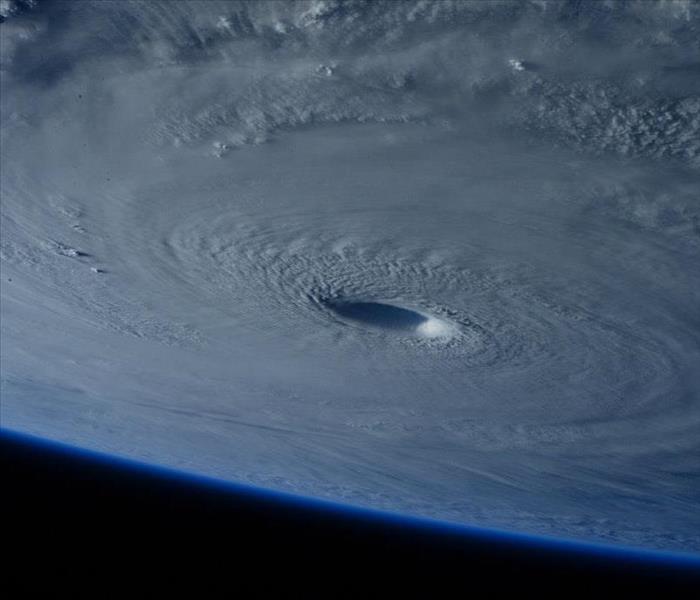 Think ahead, have a plan and be prepared
Think ahead, have a plan and be prepared
The Federal Emergency Management Agency is asking residents in the southeast to begin preparing for this year’s hurricane season.
Hurricanes are not only a threat to coastal areas, you can still be affected more than 100 miles inland. Storm surge, heavy rainfall, inland flooding, landslides high winds and tornadoes can cause catastrophic damage. The Atlantic hurricane season runs from June 1st to November 30th.
- Talk to your family and come up with an emergency/evacuation plan.
- Know your area’s risk of hurricanes.
- In case you need to leave your home, make sure your family knows where to meet.
- Have an emergency preparedness kit. Gather enough supplies to last for at least three days.
- Don’t forget about your pets
- Keep important documents in a safe place. Have your insurance information handy. Take a picture of your policy number, etc.
- Keep your car in good working condition, and keep the gas tank full.
- Only use generators outdoors and away from windows.
- If you are told to evacuate, do so immediately.
- Don’t walk, swim or drive though flood waters.
For more information visit ready.gov or download the FEMA app.
Source: https://www.ready.gov/hurricanes
Fire Safety Tips during Summer Storms
7/16/2018 (Permalink)
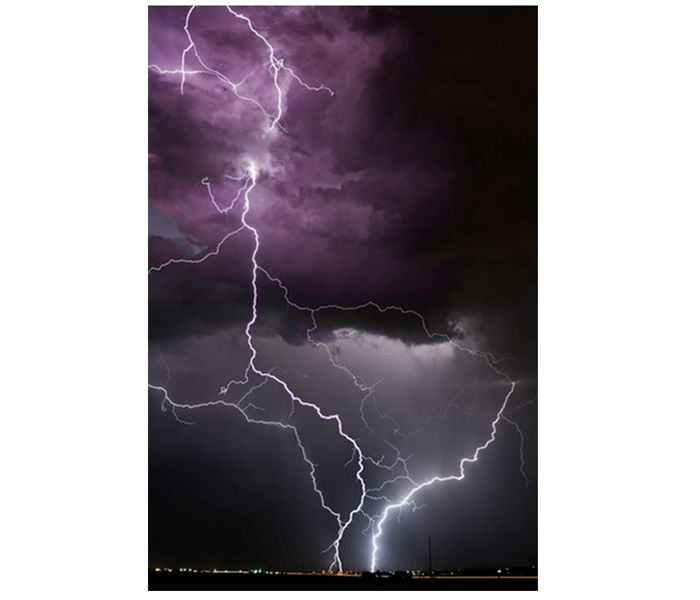 If you need us, call us today at 678-432-3003
If you need us, call us today at 678-432-3003
Around Henry and Spalding Counties, we’ve been having a very rainy and stormy summer. Here are some tips to keep your family and your home safe when severe weather hits.
- Develop and practice an evacuation plan ahead of a severe weather event. (Don’t forget to have a plan for your pets too)
- Stay out of flood waters, if possible, and do not drive into flooded areas. Even water only several inches deep can be dangerous.
- There is no place outside that is safe during a thunderstorm, and if you can hear thunder, you are within striking distance of lighting
- Stay away from windows and doors
- Turn off computers and unplug appliances
- If possible, don’t run the dishwasher or washing machine during a storm
- Wait at least 30 minutes after hearing thunder before leaving your house or shelter
Source: https://www.nfpa.org/Public-Education/By-topic/Emergency-Preparedness/Natural-disasters/Severe-storms, www.nfpa.org/education
Storm Damage Emergency Tips
7/16/2018 (Permalink)
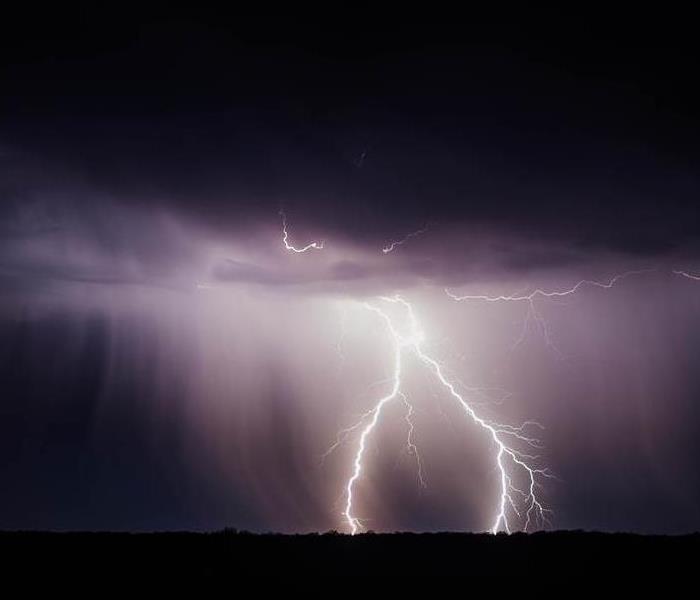 If you need us, call us at 678-432-3003
If you need us, call us at 678-432-3003
These are some do’s and don’ts on what to do after a flood
What To Do After Flooding
- Remove excess water by mopping and blotting.
- Wipe excess water from wood furniture after removal of lamps and tabletop items.
- Remove and prop wet upholstery and cushions.
- Place aluminum foil or wood blocks between furniture legs and wet carpeting.
- Turn air conditioning on for maximum drying in summer.
- Remove colored rugs from wet carpeting.
- Remove art objects to a safe, dry place.
- Gather loose items from floors.
What NOT To Do After Flooding
- Don't leave wet fabrics in place. Hang furs and leather goods.
- Don't leave books, magazines or other colored items on wet carpet or floors.
- Don't use your household vacuum to remove water.
- Don't use television or other household appliances.
- Don't turn on ceiling fixtures if ceiling is wet, and keep out of rooms where ceilings are sagging.
When Storms hit Henry County, SERVPRO is ready to help!
11/16/2017 (Permalink)
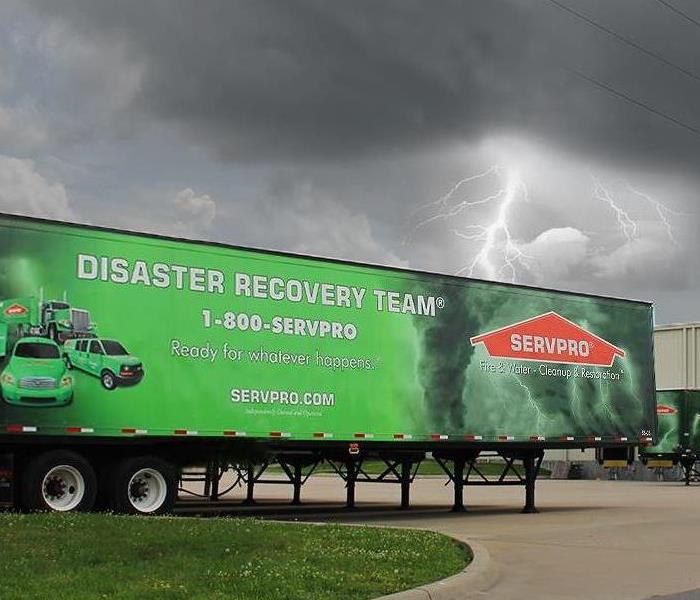 Ready for whatever happens!
Ready for whatever happens!
SERVPRO of Henry & Spalding Counties specializes in handling storm damage restoration. Our crews are highly trained and we use specialized equipment to restore your home or business to its pre-storm condition.
Faster Response
Since we are locally owned and operated, we are able to respond quicker with the right resources, which is extremely important. A fast response lessens the damage, limits further damage, and reduces the restoration cost.
Resources to Handle Storms
When storms hit Henry, we can scale our resources to handle a large storm or flooding disaster. We can access equipment and personnel from a network of more than 1,700 Franchises across the country.
We are ready to work with you if a storm ever damages your home or business!
Have Storm Damage? Call Us Today 678-432-3003
Be Ready for Any Size Disaster
8/9/2017 (Permalink)
Any type of disaster, big or small, can be scary when it is directly affecting your business. According to the latest research as many as 50% of businesses close down following a disaster; of the businesses that do manage to survive a large portion of them had a preparedness plan in place. SERVPRO offers a no cost assessment of your facility in order to provide you with an Emergency READY profile, so that you will know the exact steps to take when your business is in need. Do not let a storm take advantage of you, but instead be prepared for anything it has to throw at you!
Our Emergency READY Program and the American Red Cross Ready Rating program are perfect partners.
Call us today to schedule an assessment of your facilities. #BeAHero #beSERVPROready
Tornado Facts
8/9/2017 (Permalink)
According to The Weather Channel, Georgia is the U.S. state with the most tornadoes so far in 2017, setting a new state record of 102 tornadoes. With that in mind it is important to be knowledgeable and up to date on these facts about tornadoes.
Tornadoes are arguably nature's most violent storms. Generated from powerful thunderstorms, tornadoes generally appear as rotating, funnel-shaped clouds extending from the closed base to the ground. With winds that can reach up to 300 miles per hour, tornadoes can cause massive destruction within seconds. Damage paths can be in excess of one mile wide and fifty miles long.
- The average tornado moves southwest to northeast, but tornadoes have been known to move in any direction.
- The average forward speed of a tornado is 30 miles per hour, but may vary from stationary to 70 miles per hour.
- Tornadoes can accompany tropical storms and hurricanes as they move onto land.
- Tornadoes are most frequently reported east of the Rocky Mountains during spring and summer months.
- Tornadoes are most likely to occur between 3 p.m. and 9 p.m.
If a storm does happen to occur, please don't hesitate to contact us at 678-432-3003!
Thunderstorm Safety and How to Prepare
7/20/2017 (Permalink)
Thunderstorms can happen anywhere and they have the potential to be extremely dangerous. The typical thunderstorm is 15 miles in diameter and lasts an average of 30 minutes; nearly 1,800 thunderstorms are happening at any moment around the world! Although thunderstorms can occur year-round they are more common during the spring and summer months.
WATCH VS. WARNING
- A watch is issued when conditions are favorable for the development of severe thunderstorms in and around the watch area. It does not mean that a thunderstorm will occur, only that it is possible.
- A warning is issued when severe thunderstorms are occurring or imminent in the warning area.
BE PREPARED
- Build an emergency kit and make a family communication plan.
- Keep dead or rotting limbs trimmed to prevent them from falling during a storm.
- Do not hesitate to postpone outdoor activities.
- Secure outdoor objects that could blow away or cause damage.
- Shutter your windows and secure outside doors.
- Unplug any electronic equipment well before the storm arrives!
If your home or business is damaged from a storm call SERVPRO of Henry and Spalding Counties at 678-432-3003!
Three Ways to Prevent Storm Damage to Your Home
7/18/2017 (Permalink)
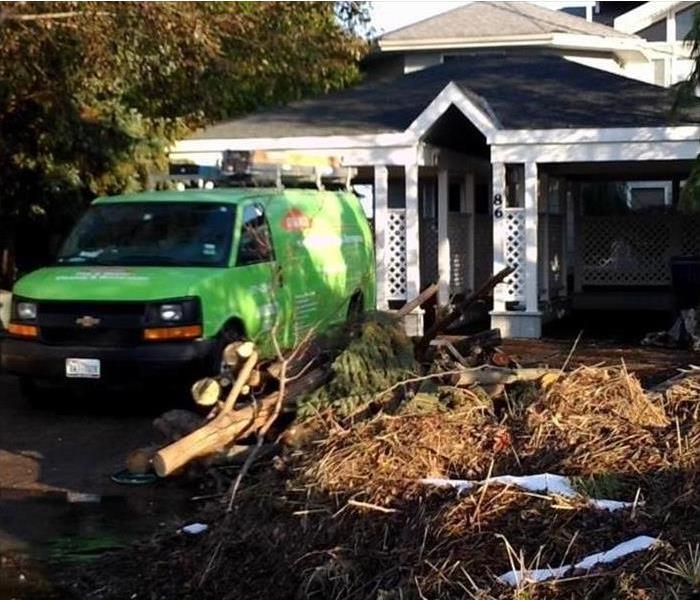 Our highly trained crews are ready to respond 24/7 to storm or flood damage in Henry and Spalding Counties.
Our highly trained crews are ready to respond 24/7 to storm or flood damage in Henry and Spalding Counties.
An unexpected storm can hit your town at any day throughout the year. While it is hard to prepare on the spot when a storm is headed your way there are several preventative measures you can take ahead of time to minimize the risk of damage to your home when severe weather does hit. According to MoonWorks here are three steps you can take before a major storm hits your town.
- Remove Dead Wood.
By trimming the trees around your home on a regular basis there is less of a chance for heavy limbs to fall on and damage your home when large winds blow through.
- Secure Outdoor Items.
When you are aware of a storm coming your way try to put all loose items such as grills, picnic tables, umbrellas, and lawn furniture inside in order to prevent damage to these items or a nearby window.
- Inspect Roof Periodically.
A brand new roof should be able to withstand most weather that comes it way, but if your roof is more like 5-10 years old it might be time to get it checked for loose shingles, nails and sheathing. It is better to go ahead and fix these small aspects of your roof now then to have to pay for the extensive damages when a big storm hits.






 24/7 Emergency Service
24/7 Emergency Service



